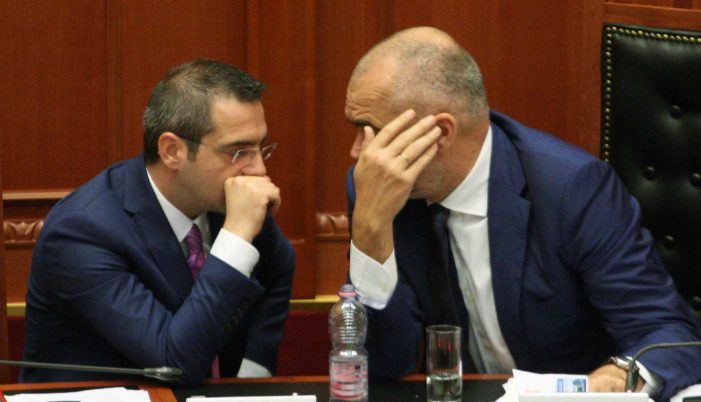
The Court of Serious Crimes has decided to place former Minister of Interior Saimir Tahiri under house arrest. Tahiri has been officially charged at the Prosecution Office for drug trafficking, membership of the criminal organization, and corruption.
Saturday, the Serious Crimes Prosecution Office issued a warrant for the arrest of former Minister of Interior Affairs Saimir Tahiri. Exit.al was the first media source to announce that Tahiri would be arrested today. Although the Prosecution Office demanded the imprisonment of Tahiri, the Court decided the lesser measure of house arrest.
A few days ago Tahiri resigned as MP, giving up his immunity, which in turn now made it possible for the Prosecution Office to arrest him.
Tahiri’s resignation came as a result of pressure from the government and the German Bundestag pressuring Prime Minister Edi Rama, by making Tahiri’s arrest a condition for the opening of accession negotiations between Albania and the EU.
A Brief History of the Tahiri–Habilaj Case
The first accusations against Saimir Tahiri as a collaborator of the Habilaj brothers were made by Dritan Zagani, former employee of the anti-drugs unit of the police in Fier and former employee of the border police in Vlora.
In 2015, Zagani accused Tahiri of lending his personal car, an Audi with number plate AA003GB, for drug trafficking toward Greece, because the border police didn’t dare to investigate the personal car of a minister.
On October 16, 2017, Moisi Habilaj, one of three Habilaj brothers, well-known to the Albanian public because of frequent public accusations for drug trafficking to Greece and Italy, was arrested in Italy.
The investigation of the Catania Prosecution Office unearthed evidence of the former Minister’s involvement with the Habilaj brothers’ criminal enterprise.
On October 19, the General Prosecution has present the parliament with the request of the Prosecution of Serious Crimes to fully strip MP Saimir Tahiri of his parliamentary immunity, which would then allow for his arrest.
On October 25, the parliament denied the request of the Prosecution of Serious Crimes to allow the possibility of arresting MP Saimir Tahiri.
On October 26, the prosecution searched the home of Saimir Tahiri.
On October 27, Tahiri was interrogated for two hours by the Prosecution of Serious Crimes about his links to the Habilaj criminal group.
On October 31, Tahiri was dismissed as the chairman of the PS in Tirana and coordinator of the co-governance platform with ordinary citizens.
On November 1, in a telephone interview with News24, Meridionews journalist Dario De Luca, who first wrote about the Tahiri–Habilaj affair, confirmed that the wiretaps published so far in the media refer to Tahiri.
On the same date, Orest Sota was arrested after fleeing from the police at a checkpoint. The 25-year-old businessman turned out to hold €800,000 in his car as well as two boating licenses of Saimir Tahiri, for boats of respectively 20 and 100 tons.
Sota claimed the money was payment for iron from the bankrupt Turkish company Kurum. Kurum denied that such payments could be made in cash and are only accepted through wire transfers.
About the boating licenses, Sota suggested that Tahiri’s driver had forgotten them in the car.
During Tahiri’s tenure, Sota’s company Eco Construction & Partners, founded in 2015, has renovated police commissariat 6 in the zone where Tahiri had been elected. Sota is the son of businessman Lefter Sota and nephew of special forces captain Vasillaq Sota.
Tahiri, and the rest of the government, remained completely silent about either the ownership of €800,000 or his boating licences. Tahiri himself always publicly denied owning a boat.
On November 7, journalist Basir Çollaku reported that Sota’s car belonged to construction company owner Armando Lilo. Lilo’s company is currently involved in the controversial construction project that has destroyed the Bus Station Park along Rr. e Kavajës
On November 15, Tahiri left Albania and traveled to Germany, allegedly to visit a sick family member in the hospital, even though Parliament had prohibited him from traveling out of the country. Neither the prosecution nor his lawyer were aware of this trip.

